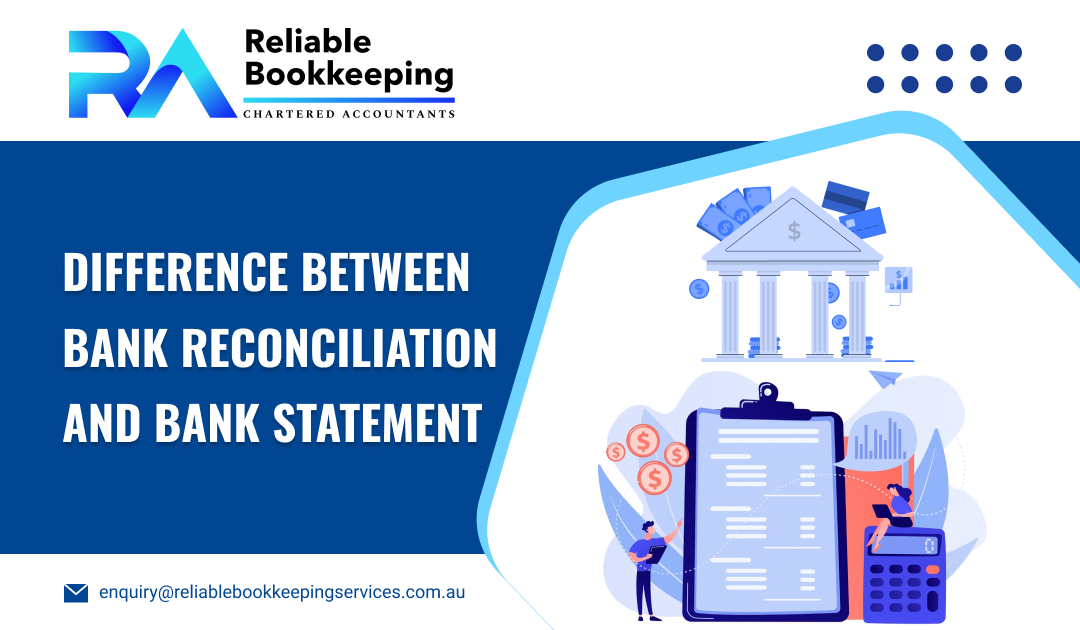All withdrawals and deposits undertaken by a customer are recorded by both a customer and a bank. The bank keeps a record of all financial transactions in a bank statement, while the customer keeps a record of all their bank transactions in a cash book. The balance recorded in a bank statement must match the balance recorded in the cash book. To check if there are any discrepancies in the records, a bank reconciliation statement is prepared.
What is a bank reconciliation?
Bank reconciliation is the process of comparing your financial records with the bank’s statement. It involves reviewing each detail in the bank statement to ensure all transactions align. This helps identify any discrepancies, errors, or missed transactions, whether in your records or the bank’s.
What is a bank statement?
A bank statement is a paper or digital document given by your bank that shows all the deposits, withdrawals, fees, and interest associated with your account over a specific period, typically a month. You can use these statements to monitor your finances, verify the accuracy of transactions, and identify any discrepancies or unusual activity.
Bank statement vs. bank reconciliation statement
It’s crucial to understand the difference between a bank account reconciliation and a bank statement. The following are some differences between a bank account reconciliation and a bank statement:
- A Bank statement is a document given by the bank showing all financial transactions in your account during a specific time period, including withdrawals and deposits. It helps you keep an eye on your account activity and balance. On the other hand, bank reconciliation is the process of comparing financial transactions with the bank statement to check for discrepancies and ensure accuracy. This is usually done by business owners or bookkeepers using other financial documents like invoices and revenue records.
- Bank statements are automatically generated by the bank. They provide a clear view of all account transactions. In contrast, bank account reconciliation is prepared by the account holder or bookkeeper, using bank statements along with other financial records.
- Bank statement is issued monthly by the bank. It demonstrates a detailed record of all financial transactions and helps you track your financial status. Bank reconciliation statement is prepared regularly, monthly or quarterly. It ensures that all financial transactions are accurately recorded by comparing your financial records to the bank statement.
How to reconcile a bank statement?
When you choose bookkeeping for small businesses, you may expect bank account reconciliation done by a bookkeeper. Bookkeepers usually follow the process written below to reconcile a bank statement:
- Collect your records
Collect your bank statement and financial records, such as your chequebook register or accounting software reports.
- Verify starting balances
Ensure that the starting balance in your records matches the starting balance on the bank statement.
- Compare financial transactions
Go through each financial transaction on your bank statement and compare it with your records. Mark off each transaction that matches.
- Identify discrepancies
Look for any transactions that appear in your records but not on the bank statement, and vice versa. These could be outstanding cheques, deposits in transit, or possible bank errors.
- Adjust your records
Adjust your records for transactions that haven’t yet been reflected on the bank statement. Add any deposits in transit, and subtract outstanding cheque. Financial records should be accurate because a tax agent in Melbourne uses financial data created by a bookkeeper to ensure a stress-free tax season.
- Complete the reconciliation
After all transactions have been reconciled and your adjusted balance matches the closing balance on the bank statement, the reconciliation is complete.
If you are unaware of the process of bank account reconciliation, it’s suggested to ask our bookkeeper to do it on your behalf. Professional bookkeepers are experts in dealing with and resolving discrepancies that occur during reconciliation.
Conclusion
Bank account reconciliation and bank statements are both important for tracking your money, but they are used for different purposes. These should not be confused. You can choose our Reliable Bookkeeping Services to receive a complete bookkeeping solution for your company.
Other Useful link:

